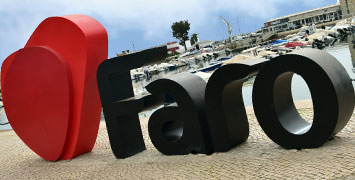Algarve-Tourist.com
The best independent guide to the Algarve
Algarve-Tourist.com
The best independent guide to the Algarve
The Capela dos Ossos (Bone Chapel) and Igreja do Carmo, Faro
The Capela dos Ossos and the Igreja do Carmo in Faro form a site of striking contrasts, where the golden exuberance of the Baroque period meets the solemn reality of death.
The Igreja do Carmo (Church of the Third Order of Our Lady of Mount Carmel) stands as one of the Algarve's most significant examples of Rococo architecture. Rebuilt in the aftermath of the 1755 earthquake, its interior is a stunning display of talha dourada (gilded woodcarving), funded by the immense wealth flowing into Portugal from Brazil during the 18th century.
Hidden in the rear garden lies the Capela dos Ossos, a structure that offers a profound counterpoint to the church's opulence. Completed in 1816, this ossuary was constructed when Faro's cemeteries reached capacity. It serves as the final resting place for over 1,245 Carmelite monks, whose remains are not merely stored but arranged with geometric precision to form the chapel's interior architecture.
Unlike the chaotic design of other ossuaries, this chapel uses skulls and long bones to create strict, orderly patterns across the vaulted ceiling and walls. It was designed as a Memento Mori, a visual sermon intended to remind 19th-century visitors of the transience of earthly life. Today, these two buildings combine to form one of Faro's most powerful historical sites, offering a journey from the gilded glory of heaven to the stark certainty of the grave.
This article will provide an image tour of the church and chapel, along with tourist information.
Related articles: Faro intro - Sights of Faro
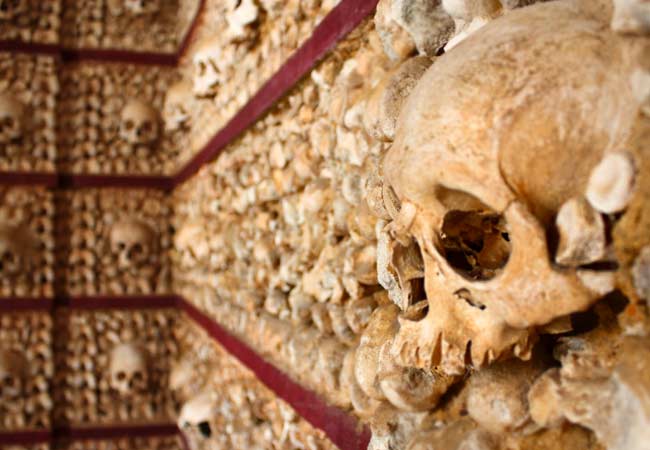
Skulls form the decoration within the Capela dos Ossos
Tourist information for the Chapel of Bones, Faro
The Capela dos Ossos is situated in the rear garden (quintal) of the Igreja do Carmo and is entered through the main church.
Opening Hours:
• Monday to Friday: 10:00 to 13:00 and 15:00 to 17:30.
• Saturday: 10:00 to 13:00 only (closed in the afternoon).
• Sunday: Closed to tourists (open for Mass only).
The complex closes for a midday break (siesta). Because access to the chapel is through the church, visits are restricted during mass and religious services.
The entrance fee is €2.00, which grants access to both the church and the bone chapel. A typical visit lasts around 20 minutes. As the chapel is very small (only 24 square meters), it can feel crowded during the summer months. The best time to visit is at opening (10:00 AM) or late in the afternoon when it will be quieter.
The Igreja do Carmo is located on the Largo do Carmo, to the north of central Faro at GPS: 37.019, -7.934 (link to google maps). It is a 7-minute walk from the marina and Jardim Manuel Bivar. Visitors should note that the church is on the opposite side of town from the main historic centre (Cidade Velha).
Insight: There is a second, much larger bone chapel in Évora. While Évora's chapel is cavernous and dark, the Faro ossuary is noted for its geometric precision and unique garden setting. A guide to the Évora chapel can be read here.
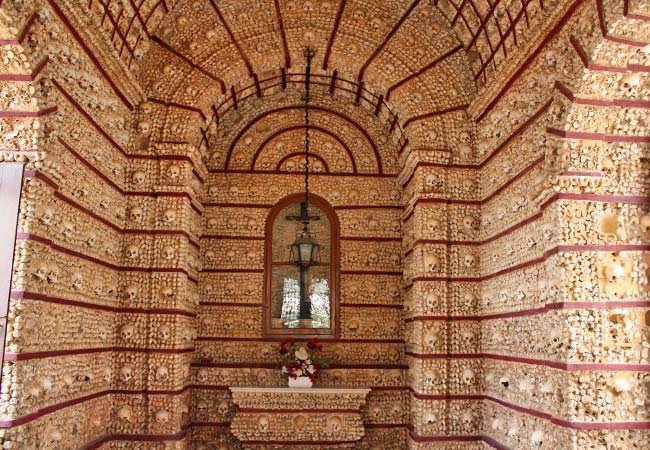
An Image tour of the Igreja do Carmo and the Capela dos Ossos
The Igreja do Carmo stands as one of the finest examples of Rococo and Baroque architecture in the Algarve. The imposing stone facade was built by master mason Diogo Tavares beginning in 1747. The design intentionally mimics the structure of a grand altar, a style known as a fachada-retábulo, effectively turning the church inside out to face the public square.
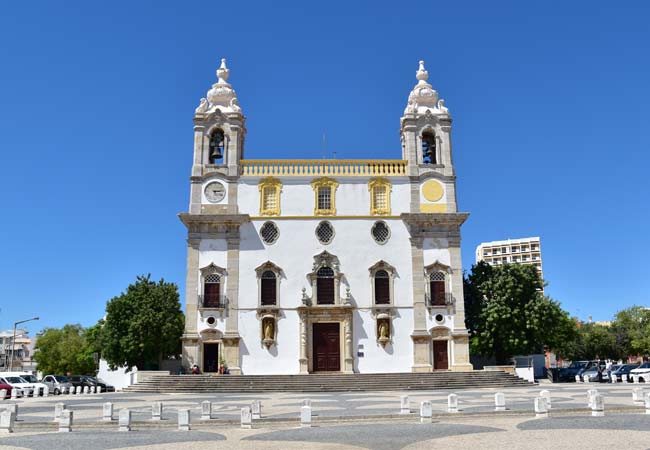
The church dominates the Largo do Carmo with its twin bell towers, which were completed in the late 19th century and are capped with flame-shaped finials symbolizing the light of faith. The facade features niches housing statues of St. Elias and St. Teresa of Avila, the spiritual founders of the Carmelite order. The square itself is paved with traditional Portuguese calçada stone, framing the golden limestone of the church.
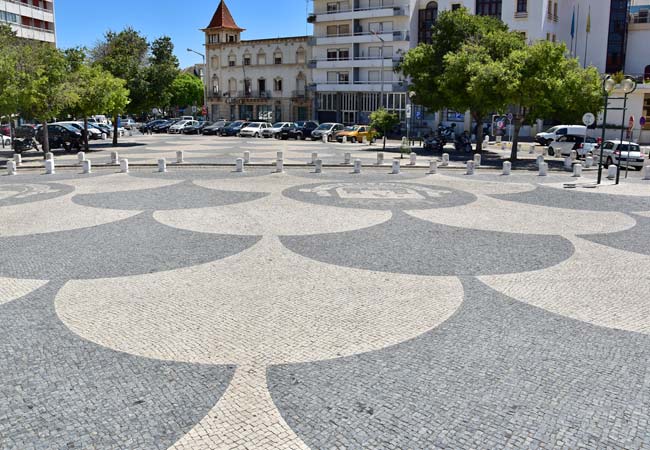
The interior is a masterpiece of talha dourada (gilded woodcarving), created by master sculptor Manuel Martins and his workshop. This lavish decoration is a record of the immense wealth, particularly gold, imported from Brazil during the 18th century. The single nave was designed to ensure nothing obstructed the congregation's view of the sermon, creating a space of intense auditory and visual engagement.
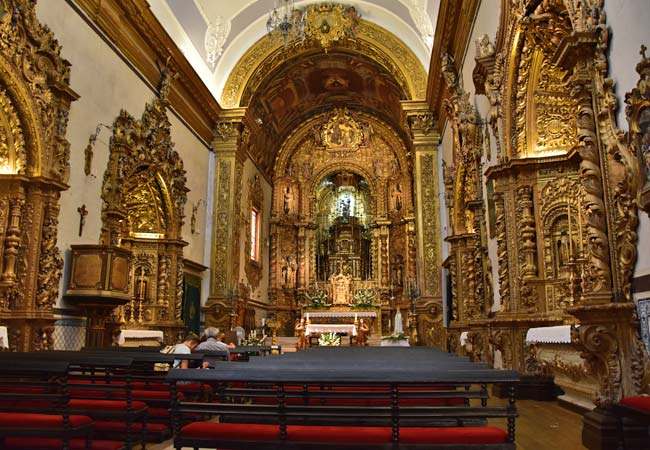
The main altar follows the "National Style" of woodcarving and features a concave plan that adds depth to the chancel. Its focal point is the pyramidal throne, or trono eucarístico, designed to elevate the Blessed Sacrament high above the worshippers. The ceiling above is painted in perspective, a trompe l'oeil effect that creates the illusion of an opening to the heavens.
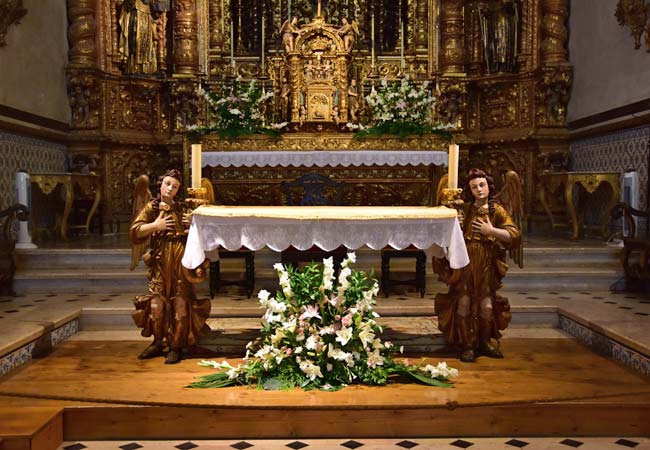
The altar in the Igreja do Carmo
After paying the entrance fee and passing through the sacristy, which houses rare images of the Passion of Christ, you will enter the rear garden (quintal). This space was originally the graveyard for the Third Order, and it was from here that the bones were exhumed to create the chapel in 1816.
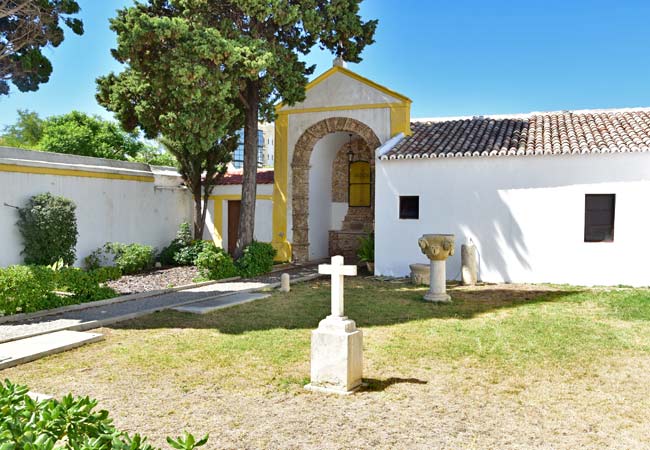
There is an exterior bone altar in the garden, though unfortunately, the skulls and bones here have suffered damage from exposure to the elements.
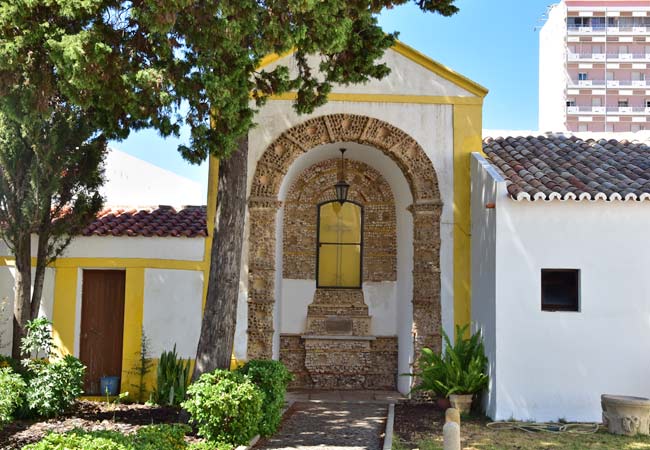
The Capela dos Ossos is housed in a whitewashed extension built specifically for this purpose. The inscription on the limestone lintel reads:
“Pára aqui a considerar que a este estado hás-de chegar”
“Stop here and consider, that you will reach this state too”.
This is an imperative command, forcing the visitor to pause and confront the inevitability of their own end.
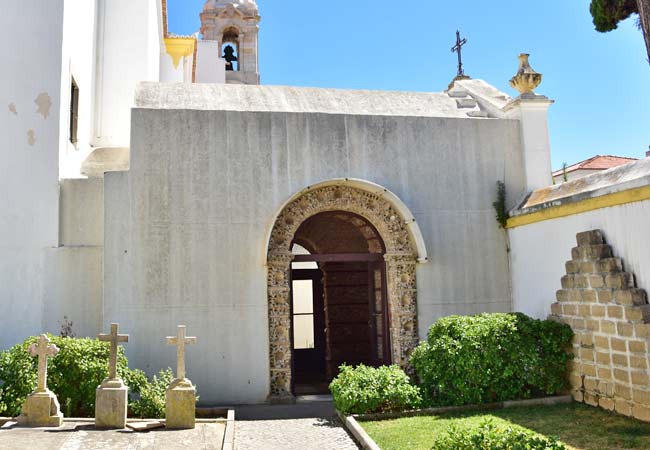
The Capela dos Ossos is physically small, measuring just 2 by 4 meters, yet it houses the remains of approximately 1,245 monks. The arrangement is strictly symmetrical, reflecting a Neoclassical influence that brings order to the chaos of death.
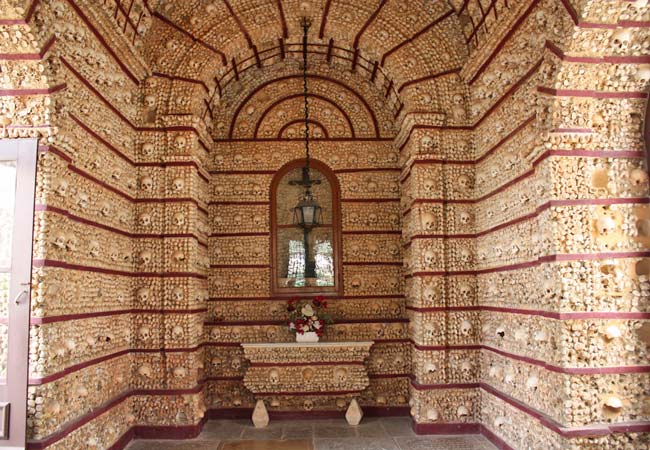
The bones line every surface, including the barrel-vaulted ceiling. Long bones like femurs and tibias are stacked to form architectural features such as cornices and arches, while skulls are placed at regular intervals as decorative bosses.
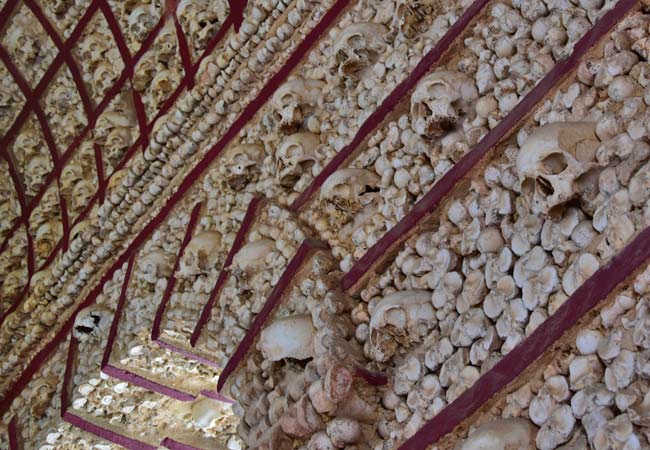
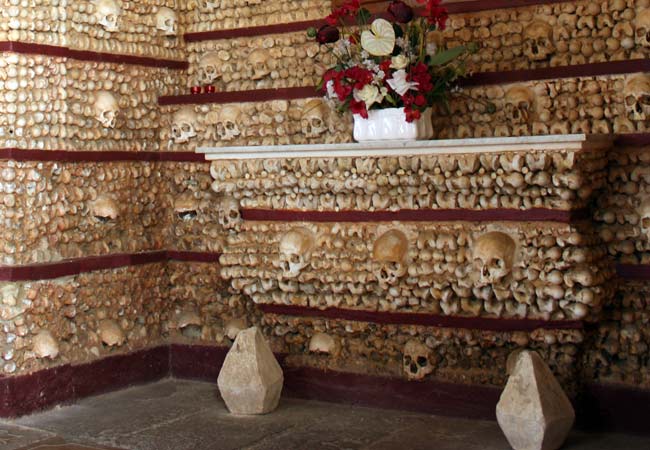
If you decide to take photos within the Capela dos Ossos, please be respectful of those who rest here.
Historical Insights and Legends of the Igreja do Carmo
Escaping the Plunder: The Igreja do Carmo's lavish golden interior is remarkably intact, unlike most Portuguese monasteries that were looted or abandoned after the dissolution of religious orders in 1834. The secret lies in its designation as a "Third Order." Unlike traditional monasteries inhabited by monks, this site belonged to a lay brotherhood of wealthy local citizens. Because it was private property rather than a monastic institution, it escaped state seizure, allowing its artistic treasures to remain intact for future generations.
The Myth of the Golden Skeleton: A persistent rumour, often found in older travel literature, claims that the bone chapel contains a complete skeleton covered in gold. Historical analysis suggests this is a conflation with other ossuaries or an exaggeration of the church's gilded wood. No such relic exists on the site today. The chapel relies solely on the collective impact of the thousands of bones rather than any single "star" attraction.
The Procession of the Oxen: The statues housed in the sacristy are not merely static decorations. They were created for the Procissão do Triunfo (Procession of Triumph), a significant event in the Algarve's calendar. Historically, this procession was unique in the Catholic world because the image of the Virgin was transported not by men, but by oxen. This tradition highlighted the deep connection between the religious order and the region's agricultural community.
Further information about the Capela dos Ossos
While the bone chapel may seem like a grim attraction for visitors today, exhuming bones from graves was a common practice in the 19th century. This was often a necessity due to limited suitable space for burial in urban centers. After a period of roughly ten years, the bones would be exhumed to make room for the newly deceased
Rather than hiding these remains in a common pit, the Third Order chose to display them as a Memento Mori, a physical reminder of the transience of life. The macabre atmosphere of the chapel is often softened by the sunlight filtering in from the garden and the sounds of the city outside.
The bones lining the chapel walls belonged to monks from the Carmelite order who worshipped at the Igreja do Carmo.
Our most popular guides for Faro and the Algarve
Expert Insight: These guides are curated by Philip Giddings, a travel writer with over 25 years of local experience in Portugal. Since 2008, Phil has focused on providing verified, on-the-ground advice for the Algarve region, supported by deep cultural ties through his Portuguese family. Read the full story here.





















